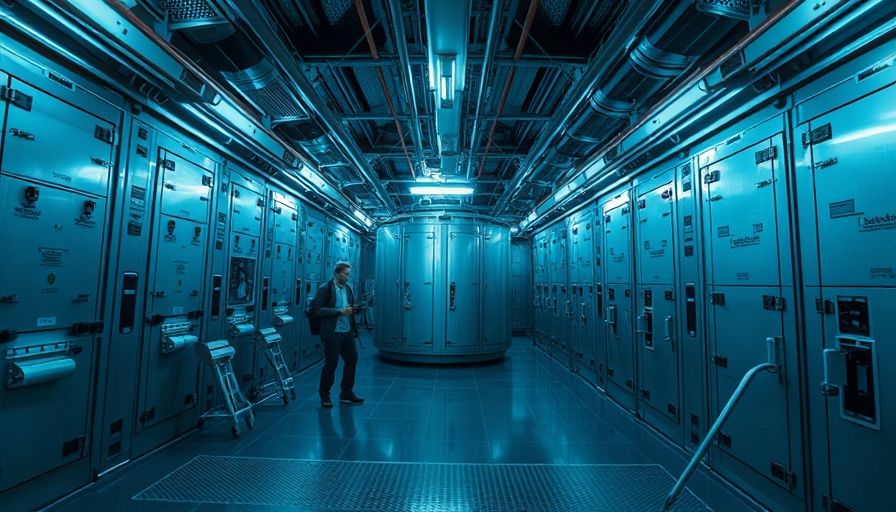
The Supreme Court's Crucial Decision on Nuclear Waste Storage
The U.S. Supreme Court has taken on a pivotal case that could reshape the future of nuclear waste storage in the United States. With over 90,000 metric tons of spent nuclear fuel waiting for permanent disposal, the stakes are incredibly high, not just for nuclear energy companies but for local communities and policymakers as well.
Historical Context: The Long Road to a Permanent Solution
Since nuclear power plants began operating in the late 1950s, the question of how to dispose of nuclear waste has been a contentious issue, laden with political implications and public concern. The Nuclear Waste Policy Act of 1982 aimed to establish a permanent storage site at Yucca Mountain in Nevada, designated to hold the nation’s nuclear waste for millennia. However, due to opposition from Nevada residents and politicians, the project has faced significant hurdles, leading the government to seek alternative storage solutions.
In the absence of a permanent solution, the federal government has leaned on the Nuclear Regulatory Commission (NRC) to approve temporary storage sites. Texas has come to the forefront of this debate, asserting that it should not carry the burden of the nation’s waste without a clear commitment from lawmakers to develop a permanent facility.
Why Texas Matters in the Nuclear Waste Debate
The state of Texas, alongside a private company, has challenged the NRC’s authority to approve a nuclear waste storage site in Andrews County, Texas, just across the border from New Mexico. Texas Solicitor General Aaron Nielson has expressed concern that establishing such a site could lead to a de facto permanent storage solution.
"If anyone thinks this is temporary, I have a bridge to sell you," he quipped during oral arguments, emphasizing the potential for the waste to remain in Texas indefinitely. As over 90,000 metric tons continue to pile up in various states, the sense of urgency for a resolution grows.
Public Safety and Environmental Considerations
The contentious nature of nuclear waste storage goes beyond politics. There are significant safety concerns regarding the potential risks of storing spent fuel rods in a densely populated and economically vital area like the Permian Basin, which is known for its extensive oil and gas production.
Justice Neil Gorsuch highlighted this worry during the hearings, questioning the wisdom of placing nuclear waste on a concrete platform in such a crucial geological zone. Public safety advocates warn that without careful management and oversight, the consequences could be dire.
The Political Landscape: Bipartisan Opposition
Interestingly, the opposition to the proposed storage sites has garnered support from both ends of the political spectrum. Texas Governor Greg Abbott, a Republican, and New Mexico Governor Michelle Lujan Grisham, a Democrat, have united in addressing the risks and implications that the interim storage could pose to their states.
This bipartisan alertness signals a broader anxiety about the future of nuclear waste management and illustrates how deeply intertwined environmental concerns are with political will. Additionally, it reflects the growing demand for a comprehensive nationwide strategy on nuclear waste disposal.
Future Implications: Seeking a Permanent Solution
The Supreme Court’s decision about the NRC's licensing will not only affect the proposed sites in Texas and New Mexico but also sets a precedent for how the government handles nuclear waste moving forward. With a growing consensus that a national storage solution is necessary, the court's ruling could propel lawmakers into action.
Malcolm Stewart, lawyer for the Justice Department, argues that it’s crucial for temporary storage facilities to operate while Congress considers long-term solutions. Given the urgency surrounding the nuclear fuel build-up, it is imperative that Congress finally takes definitive action to resolve this long-standing issue.
Conclusion: A Call for National Responsibility
The issue of nuclear waste storage is not just about logistics; it is about shared responsibility and the long-term safety of communities across the nation. As the Supreme Court deliberates, the implications of their ruling will reverberate through every state, influencing policies and affecting millions.
Now is the time for individuals, policymakers, and advocacy groups to engage in discussions about nuclear waste management and push for solutions that protect both our environment and public health.
 Add Element
Add Element  Add Row
Add Row 



Write A Comment